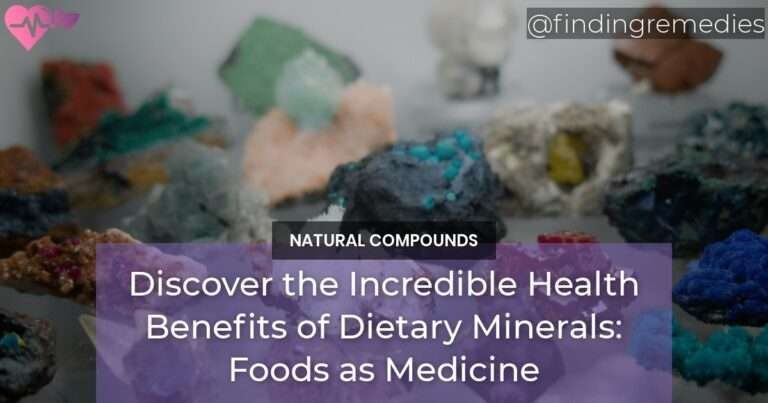Minerals are essential micronutrients that play a vital role in maintaining overall health and wellbeing. The various health benefits of minerals include various physiological functions, including building strong bones, maintaining a healthy heart, and facilitating nerve impulses.
In this article, we will explore the importance of minerals in maintaining health, the types of minerals, sources of minerals, health benefits, safety and risk factors, and the importance of meeting daily mineral requirements.
Table of Contents
Importance of Minerals in Maintaining Health
Minerals are crucial for maintaining health and are involved in several physiological processes in the body. They aid in the formation of bones and teeth, maintain fluid balance, and help in the production of energy. Minerals also play a crucial role in maintaining healthy nerve and muscle function, aiding in the metabolism of nutrients, and supporting the immune system.
Types of Minerals
Minerals can be classified into two categories: macro-minerals and trace minerals.
Macro-minerals
Macro-minerals are required in larger amounts and include calcium, magnesium, potassium, sodium, and phosphorus. These minerals are essential for maintaining healthy bones, teeth, and muscles, regulating blood pressure, and maintaining fluid balance.
Trace Minerals
Trace minerals are required in smaller amounts and include iron, zinc, iodine, copper, selenium, fluoride, chromium, and manganese. These minerals play a role in several metabolic functions, including immune function, wound healing, and thyroid function.
Sources of Minerals
Minerals can be obtained from food, supplementation, or both.
Dietary Sources
Minerals can be found in a variety of foods, including:
- Mineral-rich vegetables: broccoli, spinach, kale, cabbage, and collard greens
- Mineral-rich fruits: oranges, bananas, apples, and strawberries
- Mineral-rich nuts: almonds, cashews, and hazelnuts
- Mineral-rich seeds: pumpkin seeds, chia seeds, and sunflower seeds
- Dairy products: milk, cheese, and yogurt
- Protein sources: meat, poultry, fish, and eggs
Supplementation
Supplementation with mineral supplements is common, especially when there is a deficiency or a higher requirement for a particular mineral. Mineral supplements can be beneficial for pregnant women, individuals with specific health conditions, and those with mineral deficiencies.
Health Benefits of Minerals
Minerals play a vital role in maintaining overall health and wellbeing. Here are some of the health benefits of minerals:
Role in Bone Health
Minerals such as calcium, phosphorus, and magnesium are essential for maintaining healthy bones and teeth. Calcium is crucial for bone formation, while phosphorus aids in bone mineralization. Magnesium is also required for bone health as it helps in the absorption of calcium and vitamin D.
Role in Cardiovascular Health
Minerals such as potassium and magnesium are essential for maintaining cardiovascular health. They help regulate blood pressure and maintain fluid balance. Potassium helps counteract the effects of sodium, reducing the risk of hypertension.
Role in Pregnancy and Lactation
Minerals such as iron and calcium are crucial during pregnancy and lactation. Iron is required for the production of hemoglobin, which is essential for transporting oxygen to the fetus. Calcium is needed for the development of the fetal skeleton and maintaining healthy breast milk production.
Role in Disease Resistance
Minerals such as zinc and selenium are essential for immune function, aiding in disease resistance. Zinc is required for the development and function of immune cells, while selenium helps protect cells from oxidative damage.
Safety and Risk Factors
While minerals are essential for maintaining health, excessive intake or deficiency can lead to health problems.
Mineral Toxicity
Mineral toxicity can occur when there is an excessive intake of a particular mineral. For example, excessive intake of iron can cause iron toxicity, leading to liver and heart damage.
Mineral Deficiencies
Mineral deficiencies can lead to several health problems, including anemia, osteoporosis, and impaired immune function. Iron-deficiency anemia is the most common mineral deficiency worldwide.
Conclusion
Meeting daily mineral requirements through a mineral-rich diet is essential for maintaining overall health and wellbeing. Incorporating mineral-rich foods such as vegetables, fruits, nuts, and seeds into your diet, along with lean protein sources and low-fat dairy products, can help ensure adequate mineral intake.
While mineral supplements can be beneficial, it is essential to consult a healthcare provider before taking any mineral supplements, especially for pregnant women and individuals with specific health conditions.
References:
- Weaver CM. Potassium and health. Adv Nutr. 2013;4(3):368S-77S.
- Rosanoff A, Weaver CM, Rude RK. Suboptimal magnesium status in the United States: are the health consequences underestimated? Nutr Rev. 2012;70(3):153-64.
- Hunt JR. Bioavailability of iron, zinc, and other trace minerals from vegetarian diets. Am J Clin Nutr. 2003;78(3 Suppl):633S-9S.
- Zimmermann MB, Hurrell RF. Nutritional iron deficiency. Lancet. 2007;370(9586):511-20.

